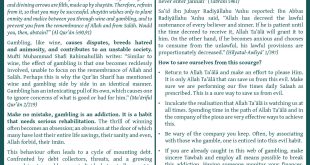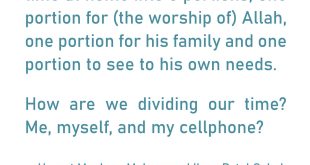
The Significance of the first ten days of Zhul Hijjah
Allah Ta’aala mentions in the Qur’aan
والفجر وليال عشر
“By (the oath of) dawn and by (the oath of) the ten nights”
Commentators of Qur’aan state that “the ten nights” mentioned in this verse refer to the first 10 nights of the month of Zhul Hijjah. The fact that Allah Ta’aala took an oath on these ten nights is sufficient to show its importance and significance.
Nabi صلى الله عليه وسلم said: “There are no days in which the worship of Allah Ta’aala is more beloved to him than the first 10 days of Zhul Hijjah. The fasting of each of these days is equivalent to the fasting of one year and the ibaadah (worship) of each night is equivalent to the Ibaadah of Laylatul Qadr . (Tirmidhi 758)
Sayyiduna Anas (radiyallahu’anhu) said: ‘It used to be said [by the Sahabah Radhiyallaahu anhum] that every day of the ten days [of Zhul Hijjah] is equal to a thousand days, and the day of ‘Arafah is equal to ten thousand days.’ i.e, in virtue. (Shu’abul Iman 3488)
The month of Zhul Hijjah also holds added significance as it is from among the 4 sacred months as well as the months of Hajj.
Actions to be carried out during this month.
- Increase the recital of Subhaanallah, Alhamdulillah, La-ilaaha illallaah and Allahu Akbar
The Hadith of Rasullullah صلى الله عليه وسلم teaches us to increasingly recite tasbeeh (subhaanallah), tahleel (laa ilaaha illallah), tahmeed (alhamdulillah), takbeer (Allahu akbar) during the first ten days of Zhul Hijjah.” (Musnad Ahmad 5446, Majma-uz Zawaa-id 4/20)
- Fasting
The fasts of each of these days (the first nine days of Zhul Hijjah) are equal to the fast of an entire year.” (Tirmidhi 758)
Fasting on the day of Arafah (9th of Zh Hijjah) also holds a special virtue – forgiveness of one past year’s sins and one future year’s sins. (Muslim 1162)
- Staying awake in ibadah during the nights
“The worship of each of these nights (the first 10 nights of Zhul Hijjah) is equal to the worship of Laylatul Qadr.” (Tirmidhi 758)
- Takbeer e Tashreeq
It is waajib (compulsory) upon every muslim, male or female, to recite the Takbeer e Tashreeq after every fardh salaah from Fajr on the 9th of Zhul Hijjah.
According to the Hanafi mazhab, one will continue reciting the takbeer after every salaah till Asr on the 13th of Zhul Hijjah.
The takbeer is as follows:
Allahu Akbar, Allahu Akbar; La ilaaha illallaahu, Allahu Akbar; Allahu Akbar, Wa lillaahi Hamd.
- Udhiyya/Qurbaani
The Hadith of Rasoolullah صلى الله عليه وسلم says:
“There is no action dearer and more beloved to Allaah Ta’aala during the days of qurbaani than the spilling of blood (i.e. the sacrificing of animals). Verily it (the sacrificed animal) will come on the Day of Qiyaamah with its horns, hair and hooves (to be weighed on the scale of good deeds); and indeed it is accepted by Allaah Ta’aala before its blood reaches the ground, therefore sacrifice with a happy heart.” (Tirmidhi 1493)
The fuqaha (jurists) have mentioned that it is mustahab (preferable) for those that are able to slaughter, to carry out the slaughter of their animal themselves. Those who are unable to slaughter should at least witness their qurbani animal being slaughtered whilst maintaining the laws of purdah.
 Wifāq ul Ulāma (SA) ASSOCIATION OF SOUTH AFRICAN 'ULAMA
Wifāq ul Ulāma (SA) ASSOCIATION OF SOUTH AFRICAN 'ULAMA


